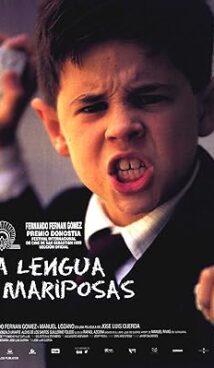Synopsis
(La Lengua de Las Mariposas)
The film, which takes place in small-town Galicia, Spain, in 1936, under the threat of the ongoing Civil War, tells the story of a beautiful, respectful friendship that develops between an elderly schoolteacher, Don Gregorio (Fernando Fernan Gomez), and a lively, curious 8-year-old boy, Moncho (Manuel Lozano), who is just going to school for the first time in his life after a long time of being homeschooled due to asthma. Contrary to the typically harsh authority of his peers, Don Gregorio believes in being caring and nurturing, encouraging self-discovery and freedom -this is particularly highlighted in an incident, the first day of school, in which Moncho accidentally urinates on himself and runs off, ashamed; his older brother, Andres (Alexis De Los Santos) finds him and brings him back-.
Outside of the school environment, Don Gregorio encourages Moncho to just observe his surroundings, absorb them as much as possible and take account of what stands out the most to him; in one of these outings, he teaches the boy about “the butterfly tongue” -a spirithorn, or proboscis, known in Spanish as ESPIRITROMPA and an important detail later on-; during this time, also, Moncho has an unexpected asthma attack and Don Gregorio, knowing about the ailment, with no other choice to assist him immediately, submerges him in a nearby pond and orders him to breathe water in as hard as he can, which seems to stop the attack and strengthens the bond between them both even further.
Moncho lives in a normal, mostly uneventful household, with a Traditionalist, religiously-inclined mother, Rosa (Uxia Blanco); a more Liberal, atheist father, Ramon (Gonzalo Martin Uriarte); and Andres, who is 15 years old. Despite the differences in ideology between Moncho’s parents, they interact well between each other and Rosa treats Ramon’s peers with marginal cordiality. In turn, Andres introduces Moncho to some grown-up realities he himself has already been exposed to, like a certain local couple who usually sneak off to the bush to have wild, passionate sex while they observe in hiding -as Andres puts it, “he rides her”-. Later on, the said couple have a fallout and, in retaliation, the man savagely beats and kills the woman’s beloved dog, “Tarzan”, which devastates her when she finds out.
The aftermath of the War eventually reaches the town, taking its toll amongst the inhabitants and forcing them to take sides, since, as per the turnout of the fight, the Nationalists -representing the eventual Right-wing Francoist Dictatorship that would rule the country for the following 4 decades- were taking over, thus putting any “Republicans” -the leftists- at risk of being pursued and repressed. In the light of this situation, Rosa and Ramon, wanting to protect their family, sever ties with any acquaintances that sympathize with the Republicans and renege on progressive ideology.
In the movie’s climax, all townspeople openly pro-Republican are rounded up, paraded in front of the Courthouse and through the streets for everyone to jeer at them and yell hurtful insults -including “Anarchist”, “atheist”, “leftist”-, and packed into cattle trucks to be taken away, their fates unknown. Don Gregorio turns out to be one of them, which shocks and saddens Moncho; yet, he is forced by his parents to do the same yelling towards his beloved teacher as everyone else did. But, in an unexpected turn, as Don Gregorio is put in a truck that drives away, Moncho runs behind, almost in the verge of tears, and starts yelling some of the words Don Gregorio had taught him during their time together -such as PTILONORRINCO (bowerbird) and ESPIRITROMPA-, thus showing the profound effect the old man had in him.

